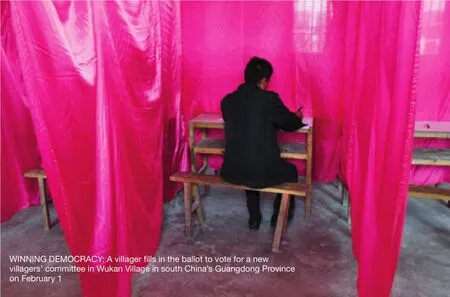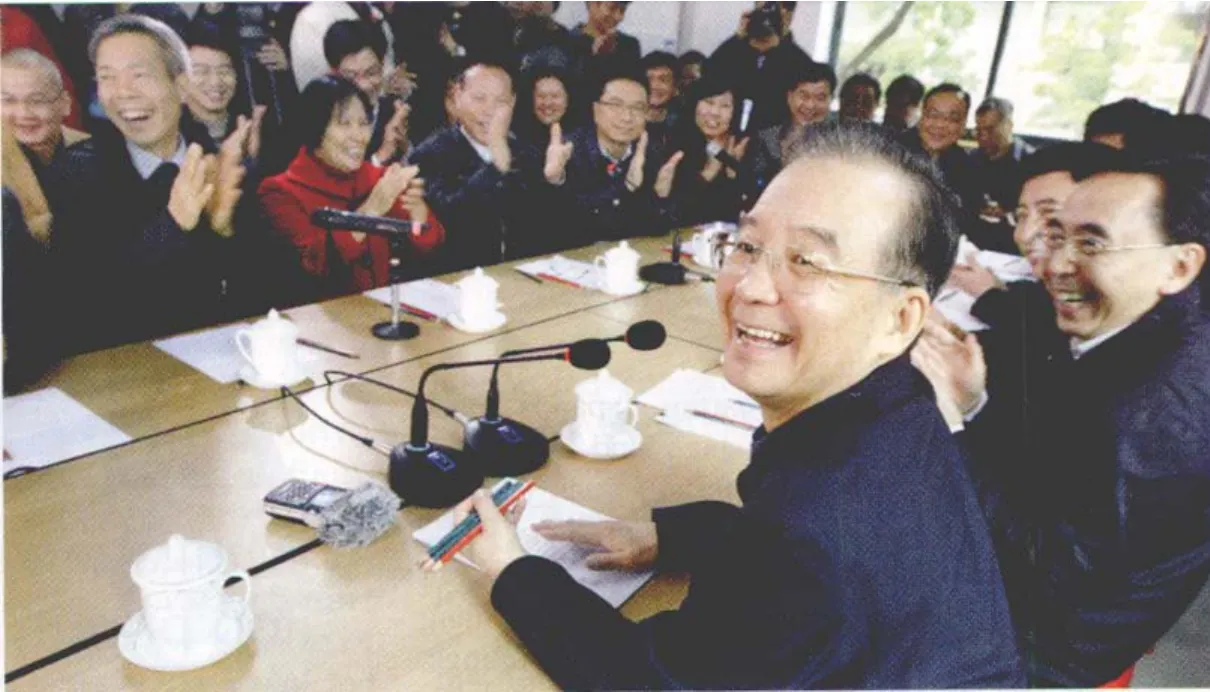Protecting Farmers‘Rights
2012-10-14SouthChinavillagerseffortstosafeguardtheirrightsreceivepositiveresponseByYinPumin
South China villagers’efforts to safeguard their rights receive a positive response By Yin Pumin
Protecting Farmers‘Rights
South China villagers’efforts to safeguard their rights receive a positive response By Yin Pumin
On February 11, a vote was held in Wukan, a fishing village in south China’s Guangdong Province.Wukan attracted worldwide attention last year following a series of demonstrations. Starting in September 2011 complaints about land use, financing and the village election escalated into violent demonstrations by Wukan villagers. One of the main demands of the protestors was for fresh elections to be held in order to replace corrupt village officials.
The elections, presided over by an 11-member election committee chosen by villagers through polling on February 1, were held to select a team of 107 village representatives and seven villagers’ group leaders.
According to local election procedures,those who applied for group leader positions were required to secure supporting signatures from at least 100 voters, while village representative candidates were required to get at least 50 signatures.
“This is to make sure the candidates are well-grounded and trusted by villagers, and to ensure fairness in the upcoming village committee election,” said Yang Semao, director of the election committee.
Of the 12,000 residents of Wukan, 8,222 are over 18 and eligible to vote. Of those,7,923 registered to vote and 6,466 secret ballots were cast to elect villagers’ group leaders and 6,475 were cast to elect village representatives, representing a turnout of more than 80 percent, according to Xinhua News Agency.
The election results were announced late on February 11. Following the counting, the number of village representatives was increased to 109, as some candidates received an equal number of votes.
However, the poll failed to elect villagers’group leaders, as all the candidates standing received less than 50 percent of the votes from each group administered by the village.Local of fi cials said that the leaders would be elected in future elections in line with stipulated procedures.
“Everything is heading in the right direction in Wukan,” said Lin Zuluan, a protest leader who now serves as secretary of the Wukan Village Committee of the Communist Party of China (CPC). “A vote for the new villagers’ committee, has also been scheduled.It will take place on March 1.”
In accordance with China’s Constitution and the Organic Law on Villagers’Committees, such committees are established to facilitate self-governance by villagers.
Settled protests
In September and November, villagers in Wukan, which is administered by Lufeng City,repeatedly staged protests against village authorities over illegal land sales and other issues.
The villagers gathered again on December 11, 2011 after Xue Jinbo, a man who was suspected of organizing the November demonstrations, died during police custody. Local police sealed off roads to the village to isolate the protestors.
The standoff between villagers and the local government was not defused until December 22 last year when Zhu Mingguo,Vice Secretary of the Guangdong Provincial Committee of the Communist Party of China,held direct talks with villagers and promised a fair and open investigation.
Zhu admitted that the protesting villagers’main requests were reasonable and “some mistakes” had been made by local of fi cials.
On December 19, 2011, a special work group organized by the Guangdong ProvincialGovernment began to look into the villagers’complaints. Results of initial investigations were released at the end of the month, indicating that some village of fi cials had violated the law and ethics of of fi ce by selling farmland in Wukan for commercial use.

CFP

A SIGNIFICANT VISIT: Chinese Premier Wen Jiabao talks with famers from Shuili and neighboring villages in Guangzhou,south China's Guangdong Province, on February 4
“The issue of land use, including collecting land from villagers and sales to developers, has not been publicly and fairly disclosed to residents in Wukan since the 1990s,” said Yang Junbo, Deputy Director of the Guangdong Provincial Department of Land and Resources, who was in charge of investigating the land issue under the provincial work group.
Beginning in 1993, the former Wukan Villagers’ Committee sold more than 42 hectares of farmland for commercial use. Only 3.6 hectares of this land was approved or offi cially registered for use by local authorities,the preliminary investigation showed.The village has a total area of 638 hectares, of which 88 hectares are arable land.
In one case, residents requested the return of 30 hectares of farmland that was bought and developed by a company jointly owned by the villagers’ committee and a Hong Kong company.
The sale of the land, which was actually 4 hectares larger than the approved area, was not disclosed to residents.
In response to the villagers’ request,the Lufeng City Government annulled the land transaction, and returned the land to local villagers for farming. The Hong Kong-based developer would receive some compensation, said local government sources.
Investigators accused some village officials, including Xue Chang, former Party chief of Wukan, and Chen Shunyi, former head of the Wukan Villagers’ Committee, of embezzling public assets and accepting bribes during the sale of farmland. For example, Xue allegedly embezzled public funds to purchase a car worth 200,000 yuan ($31,746) for personal use in July 2010.
Provincial officials also announced that the villagers’ committee election in Wukan in February 2011 was invalid and new elections were to be organized.
The previous election drew complaints from villagers, who complained that a list of candidates was never published and that some of the candidates were also election organizers, both of which go against laws and local regulations on villagers’ committee elections.
On January 15, a new Party branch and a work team were set up in Wukan to prepare for the upcoming re-election of the villagers’committee.
Solutions
In recent years, China has seen a surge of protests, particularly in the country’s wealthy coastal rural areas, which are sparked by issues from pollution to land seizures. Local authorities have been urged to change their modes of governance in order to effectively address public complaints.
Guo Weiqing, a professor at the Sun Yat-Sen University in Guangzhou, capital of Guangdong Province, said that China’s recent economic and social changes have created a number of social problems, which make eruptions of public anger more likely.
“Local governments often respond to crises and demonstrations inappropriately. They often attempt cover-ups and try to suppress demonstrations. But improper measures may turn what begins as a peaceful airing of grievances into a violent confrontation,” Guo said.
In 2010 alone, there were around 180,000 protests and other mass incidents in China,three times the number reported in 2003,according to Sun Liping, a professor of sociology at Tsinghua University.
Although of fi cial statistics for 2011 were unavailable, most people believe the number of mass incidents increased last year.
Because of these increasing tensions, the Central Government has begun paying more attention to farmers’ issues.
On February 1 a policy document was jointly issued by the CPC Central Committee and the State Council, China’s cabinet. It says the government will accelerate revisions of relevant laws to improve its policies regarding rural land.
“The transfer of land use rights must be voluntary, fully compensated and conducted in accordance with the law,” the document says.
Local authorities are required to step up the registration of rural land ownership and steadily carry out pilot programs to reform land contracts in rural areas. Meanwhile, the document pledges greater efforts to improve the rules governing conciliation and arbitration with regard to land disputes.
On a visit to Shuili Village in Guangzhou on February 4, Premier Wen Jiabao called for more efforts to ensure farmers’ land rights.
Unauthorized expropriation of farmland has been a common problem, causing many complaints and even mass disturbances, Wen said.
The premier also highlighted the need to ensure farmers’ voting rights and the direct election of village-level leadership in a fair and transparent manner, which he labeled a crucial task for local authorities.
Wen said self-governance is the only appropriate means to improve the administration of rural communities and local affairs should be decided by local villagers.
At the annual central conference on rural work in December 2011, Wen said that China should strive to promote agricultural modernization and protect farmers’ rights to boost the development of rural areas.
“No one is empowered to deprive farmers of their rights,” Wen said, adding that any failure in agriculture would hamper the country’s economic development and social stability.
